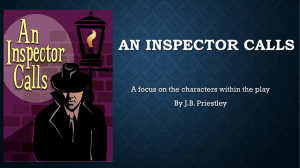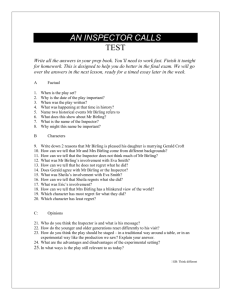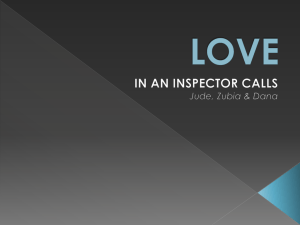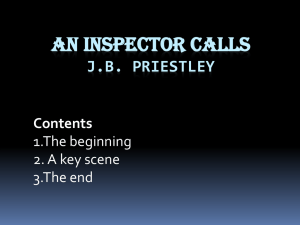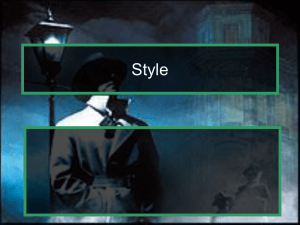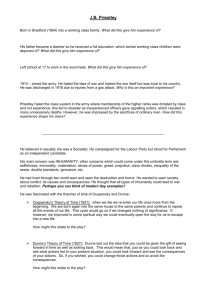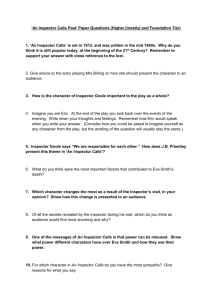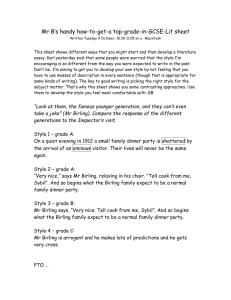AN INSPECTOR CALLS - Precoursework booklet Setember 2010.doc
advertisement
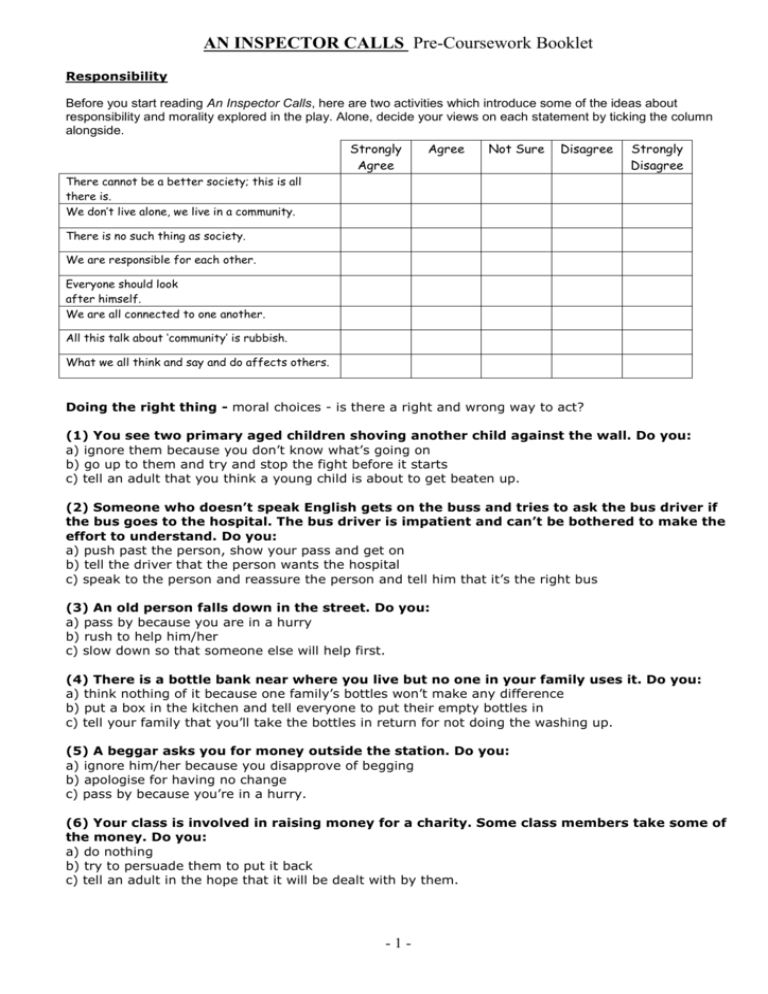
AN INSPECTOR CALLS Pre-Coursework Booklet Responsibility Before you start reading An Inspector Calls, here are two activities which introduce some of the ideas about responsibility and morality explored in the play. Alone, decide your views on each statement by ticking the column alongside. Strongly Agree Agree Not Sure Disagree Strongly Disagree There cannot be a better society; this is all there is. We don’t live alone, we live in a community. There is no such thing as society. We are responsible for each other. Everyone should look after himself. We are all connected to one another. All this talk about ‘community’ is rubbish. What we all think and say and do affects others. Doing the right thing - moral choices - is there a right and wrong way to act? (1) You see two primary aged children shoving another child against the wall. Do you: a) ignore them because you don’t know what’s going on b) go up to them and try and stop the fight before it starts c) tell an adult that you think a young child is about to get beaten up. (2) Someone who doesn’t speak English gets on the buss and tries to ask the bus driver if the bus goes to the hospital. The bus driver is impatient and can’t be bothered to make the effort to understand. Do you: a) push past the person, show your pass and get on b) tell the driver that the person wants the hospital c) speak to the person and reassure the person and tell him that it’s the right bus (3) An old person falls down in the street. Do you: a) pass by because you are in a hurry b) rush to help him/her c) slow down so that someone else will help first. (4) There is a bottle bank near where you live but no one in your family uses it. Do you: a) think nothing of it because one family’s bottles won’t make any difference b) put a box in the kitchen and tell everyone to put their empty bottles in c) tell your family that you’ll take the bottles in return for not doing the washing up. (5) A beggar asks you for money outside the station. Do you: a) ignore him/her because you disapprove of begging b) apologise for having no change c) pass by because you’re in a hurry. (6) Your class is involved in raising money for a charity. Some class members take some of the money. Do you: a) do nothing b) try to persuade them to put it back c) tell an adult in the hope that it will be dealt with by them. -1- (7) In the play the Inspector says: “we are all members of one body” – we have a responsibility to others. What is the opposing concept to this? You will have to work out which character in the play explicitly embodies this doctrine. (8) Are people just idealistic ‘cranks’ if they believe in ‘communal responsibility’? – i.e. the concept that members of a society have some duties and obligations to each other’s welfare. (9) What can happen if we ignore this responsibility to others? What is in place today to help others? HISTORICAL EVENTS OF THE TIME A play set in 1912, you need to understand the historical context if you are to understand issues raised in the play, through looking at life in England at the time. Sailing of the Titanic (imminent departure mentioned in the play) Captain Scott and his expedition failed to reach the South Pole. The Suffragette movement campaigning for women's rights. Coal miners and others on strike for better pay and conditions. Some unrest in Russia beginning, mentioned in the play. Trade unions beginning to gain some power in society. Advances of technology: electric lighting in homes & cinema (mass media). Motor cars developing, but only owned by those who were rich enough to do so. No help from the state for poor. No DHSS or NHS & life expectancy about 46 years. Class System People were expected to know their place in society and stick to it and moving from one section of the class system to another was frowned upon by those in power. Workers were beginning to let it be known that they wanted to have a say in what happened to them and did so through strikes and the formation of trade unions to co-ordinate these actions. This was a strange idea to those who owned the factories and workplaces, who expected to have complete control over all aspects of their workers lives. The bosses wanted things to stay as they always had been, with them in control of the labour, jobs, conditions and pay. The bosses, being of a higher class than the workers, believed that they knew best and should make decisions for the masses. These were mainly based on how much profit they could make and they rarely considered the welfare of the workers. In the play itself the main family, the 'Birlings' are wealthy middle class landowners and proprietors of a large factory that was built up by the father of Mr. Birling. He has hopes of gaining a Knighthood, due to his service as a magistrate and as Lord Mayor, which he sees as his way to climb the social ladder to the lower rungs of the aristocracy. This is shown in the way in which he compares this to the mother of his daughter's fiancée, Lady Croft, who is already, part of the aristocracy. Therefore, it can be seen that by marrying Gerald Croft, Sheila is playing a part in the families' social climbing. Is it fair for the wealthy to control the lives of the poor for their own profit? Should all people have a say in their lives and their conditions of work? Do you think that the poor could have done anything other than strike? -2- Quick Questions on Phase One Pages 1-10 1. The Birlings’ maid is called __________. 2. Sheila has just become engaged to _________. 3. Sheila’s father is called _________ Birling. 4. Eric has been _________ too much. 5. Sheila’s brother is called ________. 6. Gerald Croft’s parents are _____________________ . 7. Mr Birling is pleased because the Crofts will be able to work _________. 8. Mrs Birling __________ Gerald and Sheila on their engagement. 9. Gerald gives ________ an engagement ________. 10. Mr Birling makes a long _______ to the family. 11. Mr Birling said, “The __________ don’t want war”. 12. Birling offers Gerald a __________. 13. Birling thinks he might get a knighthood in the next ________ ________ 14. Mr Birling says that “a man has to make his own way – has to look after ________.” Who said it in Phase One? All of these quotations are spoken before the arrival of the inspector. Who said them? 1 2 3 4 5 6 7 8 9 10 11 12 13 14 15 16 17 18 They worked us hard in those days and kept us short of cash. Now, Arthur, I don’t think you ought to talk business on an occasion like this. Good dinner Sybil. Tell cook from me. Please, sir, an inspector’s called. When you’re married, you’ll realise that men with important work to do sometimes have to spend nearly all their time and energy on their business. You see, I was Lord Mayor here two years ago when Royalty visited us. Yes, you’ve piled it on a bit tonight Father. Arthur, you’re not supposed to say such things. What an expression, Sheila! In fact, I insist upon being one of the family now. Just let me finish, Eric. You’ve a lot to learn yet. You’d think a girl never had any clothes before she gets married. She comes from an old country family…. … a man has to mind his own business and look after himself and his own… Yes – except for last summer, when you never came near me… You’re squiffy. Yes, go on, Mummy. You must drink our health. The Germans don’t want war. ACT 1 – PHASE 2 (pg 10 – pg 16 Edna’s announcement of the Inspector’s arrival – Sheila’s re-entry – “what’s this about streets”.) Impt. - ‘The lighting should be pink and intimate until the INSPECTOR arrives, and then it should be brighter and harder.’ This is of course symbolic. The Birlings etc lead comfortable, protected lives until the Inspector brings in the harsh reality of life outside their household. Point out that this does two things. First it signals the change in mood of the play. With the arrival of the Inspector a note of tension and menace is introduced. Secondly, the increased intensity of the light suggests the inspector is going to throw some light on events in the past which have been concealed. -3- 1 Write down three things about the inspector. See page 11 2 1) 2) 3) Why does the inspector refuse a drink? 3 How long before the arrival of the inspector did Eva Smith die? 4 When was Arthur Birling Lord Mayor of Brumley? 5 Why does Arthur Birling know the police officers in Brumley? 6 How did Eva Smith die? 7 What two things did Eva Smith leave behind in her room? 8 1) 2) How many women were employed in Birling’s works? 9 Which part of Birling’s factory did Eva Smith work in? 10 How long did the strike at Birling’s works last? ACT 1 – PHASE 3 ( pg 16 – End of Act 1) 1 2 3 4 5 6 7 Who does Arthur Birling sometimes play golf with? How old was Eva Smith? How long was Eva Smith out of work after Birling sacked her? What was the name of the shop where Eva got a job? When did she start work there? Why did Eva Smith lose her job in the shop? What did Eva Smith call herself after she left the shop? SUMMARY OF ACT ONE When the play opens the Birling family is celebrating the ................................ of Sheila and Gerald ................................ The mood seems to be ................................ friendly and happy. Arthur Birling hopes that the marriage will help his ................................ Birling’s social aspirations become apparent when he tells Gerald that he might be in line for a ................................ He says that ‘a man has to make his ................................ Inspector Goole arrives immediately after this and announces that he is investigating the suicide of a girl named ................................ who killed herself by swallowing ................................ He says that she left a diary and a ................................ With the arrival of the inspector a note of ................................ and menace is introduced, and the audience expects the complacency of the Birlings to be ................................ The Inspector shows Birling a photograph and he then recognises her as the girl he ............ after a dispute over wages. The inspector soon adopts a very ................................ tone which continues throughout the play. Birling tries to defend himself by referring to his friendship with ................................ Sheila is the next to be interrogated. She admits ................................ to the manager at Milwards because she thought Eva was ................................ at her when she tried on a dress. As a result of this, Eva, or Daisy Renton was ................................ Sheila feels very ................................ about her behaviour and feels ................................ towards Eva Smith. She is open and ................................ about her involvement with the girl. When Gerald hears the name Daisy Renton he reacts so ................................ that his own involvement with the girl is ................................ At the end of Act I he admits to ................................ that he was having an ................................ with Daisy Renton over the ................................ -4- ACT 2 – PHASE 1 ( pgs 27 - 40 when Gerald leaves) QUICK QUESTIONS 1 How did Mrs Birling find out that Eric had been drinking far too much? Who told her? 2 What made the inspector realise that Gerald had known Daisy Renton? (pg 33). Find the place in Act One when he and Sheila realise this. 3 Where did Gerald meet Daisy Renton? (pg 34) 4 Where did Gerald arrange for Daisy to live? (pg 37) 5 Which phrase on page 39 tells us that Daisy Renton really loved Gerald? 6 We know that Gerald was being unfaithful to Sheila. We know that he was making excuses to Sheila – telling her he was too busy at work to see her very often. What does this reveal about his character? ACT 2 – PHASE 2 ( pgs 40 - End of Act 2 ‘…begged you to stop’.) 1. Underline the words or phrases that could be used to describe Mrs Birling? proud gentle sympathetic understanding self-centred weak unsympathetic generous warm self-satisfied friendly selfrighteous strong lacking conscience 2. What was the purpose of the Brumley Women’s Charity Organisation? What work did it do? 3. What did Eva Smith call herself when she went to the committee? 4. Why did Eva Smith desperately need help from the committee? (pg 45) 5. The inspector said that Eva Smith needed more money. What else did he say she needed? You need 3 words. 6. Write two or three sentences explaining what Eva Smith told the committee. You need to read page 46 again. ACT 3 – PHASE 1 ( pgs 50 –56 Inspector leaves ) 1. Eric first met Eva Smith in ____________. 2. Eric met Eva in the _________ bar. 3. Eric was drunk an ___________ to make a row. -5- 4. Eva told Eric that she thought she was going to have a _________. 5. Eric was very _________ about it. 6. Eva did not want Eric to __________ her. 7. Eric started to give Eva ____________ money. 8. Eric gave Eva about ___________ pounds. 9. He had stolen money from his father’s _____________. 10. Eric said he did mean to ________ the money back. 11. Eric said he couldn’t go to his ____________ when he was in trouble. 12. Eva would not take any more stolen __________ from Eric 13. Eva asked Mrs Birling’s ___________ for help. 14. They _________ to help her. 15. Eric said his mother had killed her ____________ 16. Eric was very angry with his ______________. ACT 3 – PHASE 2 ( pgs 56 – End of Play) 1 The inspector said it was too ________ to help Eva Smith. 2 The Inspector said, ‘We are ________ for each other’. 3 Mr Birling said he ________Eric for the trouble. 4 Mr Birling said there would be a public _________. 5 Eric’s father said he had to pay the __________back. 6 Eric said he was __________ of his parents. 7 Mrs Birling said the inspector was ________ and assertive. 8 Sheila said the Inspector had made them ___________. 9 Mrs Birling thought that she had only done her ________. 10 Gerald said he had asked a police _________ about inspector Goole. 11 Mr Birling __________ the Chief Constable. 12 The Chief Constable was called Colonel ________. 13 Eric and Sheila still felt ________ about what they had done. 14 Eric said they had all helped to __________ Eva. 15 His father told him to hold his ____________. 16 Gerald said the Inspector might have had more than one ___________. 17 Mr Birling said there was no ______ that Daisy Renton was really Eva Smith. 18 Gerald said that perhaps no one committed __________ 19 He rang the ___________ in Brumley. 20 At the end of the play another ____________ was on his way. -6-
